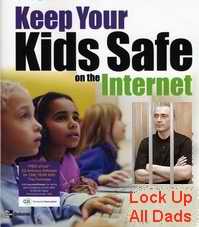 A congressional bill that would impose
strict new obligations on American tech companies doing business with "Internet-restricting countries" like China has cleared its first hurdle to becoming law.
A congressional bill that would impose
strict new obligations on American tech companies doing business with "Internet-restricting countries" like China has cleared its first hurdle to becoming law.
The Global Online Freedom Act, introduced in February by Rep. Christopher
Smith, passed by a unanimous voice vote in the U.S. House of Representatives subcommittee that focuses on Africa, global human rights and international operations.
Smith proposed the bill just days after a daylong congressional hearing at which
politicians lashed out at representatives from Microsoft, Google, Yahoo and Cisco Systems for compliance with China's state-sponsored censorship regime: The growth of the Internet and other information technologies can be a force for democratic change
if the information is not subject to political censorship,
The concerns among politicians flared up after reports that, under pressure from the Chinese government, Microsoft had deleted a journalist's blog, Yahoo had turned over information
leading to the conviction of at least one Chinese journalist, and Google was offering a restricted search service there.
The approved bill attempts to target those practices directly. Under its list of "minimum corporate standards,"
American businesses would be barred from keeping any electronic communication, such as e-mail, that contains personally identifiable information on servers or other storage facilities in "Internet-restricting countries." The rules would also
prohibit them from turning over personal information about their subscribers to governments in those locales except for "legitimate law enforcement purposes."
All search engine providers would be required to give the U.S. State
Department's Office of Global Internet Freedom a detailed breakdown of how their search results have been restricted or censored in such countries. All Web content hosts would have to supply a list of URLs that have been removed or blocked there.
Internet service providers could also face fines of up to $2 million per offense and imprisonment for blocking access to any U.S. government-sponsored Web site or content, such as Voice of America, in the blacklisted countries.
Although China has
taken center stage, the bill says the rules would also apply to dealings with Belarus, Cuba, Ethiopia, Iran, Laos, North Korea, Tunisia and Vietnam--along with any other country on which the U.S. government decides to bestow an
"Internet-restricting" designation.
US Phone Companies Censor Private Communications
Based on an article
from the Washington Post
Now playing on your Web-enabled cell phone: a PG-rated version of the Internet. As people increasingly listen to music, watch TV, and access
the Web on their handsets, they notice significant content restrictions that don't exist on PCs.
Major U.S. wireless carriers have set censorial guidelines for their content partners, restricting or banning potentially offensive language,
ringtones, games, and videos--including, in some cases words, such as lesbian or pictures of women in swimsuits. In informal tests of text and multimedia messaging, we found that messages containing adult images and vulgar language did not always show up
on the intended recipient's handset.
Why the restrictions? Wireless carriers want to ward off nutter complaints--and regulation by the Federal Communications Commission, according to Julie Ask, an analyst with Jupiter Research.
Are cell phones next on the feds' censorship wish list? You'd better believe it, said Adam Thierer, a senior fellow at the Progress & Freedom Foundation .
CTIA , the wireless industry trade group, has
proposed wireless content guidelines that encourage network operators to label, filter, and limit access to words, images, and even sounds that some adults may consider inappropriate for children. But wireless carriers are imposing restrictions even
stricter than the rules that the FCC imposes on broadcast TV and radio.
In content available through its handsets, Verizon Wireless prohibits the use of obscene language as well as images or videos that depict "passionate kissing." The
carrier has specific rules for how much bare skin models may show and for what titles of digital files people can download.
Anything you can access through your Verizon Wireless phone is appropriate for the entire family, says Verizon
Wireless spokesperson Jeffrey Nelson.
Cingular Safe content guidelines, meanwhile, ban such words as words condom and lesbian along with images depicting or insinuating nudity or partial nudity. The guidelines, which Cingular distributes
to its content-provider partners, cite theSports Illustratedswimsuit issue as an example of inappropriate material.
T-Mobile says that its standards for wireless content are on a par with those governing the covers of mainstream magazines
displayed on newsstands.
Are carriers also censoring messages that one user sends to another? We sent a slew of R- and NC-17-rated text and images to handsets, using a variety of carriers, and found that some messages sent over Cingular and U.S.
Cellular's networks did not reach their destination, or were changed in transit. Spokespersons for these carriers say that they don't censor text or multimedia messages.
However, messages do travel across numerous other network components
outside U.S. Cellular, some of which may filter messages based on content, says Jonathan Guerin, U.S. Cellular spokesperson.
Cingular did not respond to our requests for an explanation of why images with mature-themed file names were replaced
by a red X when they reached Cingular handsets.
 At a hearing before the House of Representatives' Subcommittee on
Oversight and Investigations, politicians served up a dizzying slew of suggestions about what kind of new federal laws should be enacted.
At a hearing before the House of Representatives' Subcommittee on
Oversight and Investigations, politicians served up a dizzying slew of suggestions about what kind of new federal laws should be enacted.  A congressional bill that would impose
strict new obligations on American tech companies doing business with "Internet-restricting countries" like China has cleared its first hurdle to becoming law.
A congressional bill that would impose
strict new obligations on American tech companies doing business with "Internet-restricting countries" like China has cleared its first hurdle to becoming law.  A DVD featuring violent pit bull fights has
unleashed protests against the distributor as well as several online merchants that had been selling the video, which may break federal laws against animal cruelty.
A DVD featuring violent pit bull fights has
unleashed protests against the distributor as well as several online merchants that had been selling the video, which may break federal laws against animal cruelty.  Operators of commercial
websites with sexually explicit content would have to post warning labels on each offending page or face imprisonment under a new proposal in the US Senate.
Operators of commercial
websites with sexually explicit content would have to post warning labels on each offending page or face imprisonment under a new proposal in the US Senate.  Televisions stations affiliated with CBS Corp.
have asked the FCC to drop a $3.3 million fine for alleged violations of federal broadcast standards for indecent content.
Televisions stations affiliated with CBS Corp.
have asked the FCC to drop a $3.3 million fine for alleged violations of federal broadcast standards for indecent content.  Obscenity prosecutions are taking a toll on the US porn
industry as publishers embrace an every-man-for-himself approach under relentless Bush administration attacks.
Obscenity prosecutions are taking a toll on the US porn
industry as publishers embrace an every-man-for-himself approach under relentless Bush administration attacks.  Evangelical Christians are on the front
lines in the battle over indecency on US cable television, calling for a pick-and-choose pricing plan that would allow viewers to keep certain channels out of their homes.
Evangelical Christians are on the front
lines in the battle over indecency on US cable television, calling for a pick-and-choose pricing plan that would allow viewers to keep certain channels out of their homes. 
 Writer-director John Cameron Mitchell presented his latest film
Shortbus, which was shot in New York at the Cannes Film Festival this week. It is notable as his actors have actual sex in the scenes.
Writer-director John Cameron Mitchell presented his latest film
Shortbus, which was shot in New York at the Cannes Film Festival this week. It is notable as his actors have actual sex in the scenes.  Locals artists have sued the city after an art show at a local park was closed when the city dismantled an art exhibit it deemed
“too racy.”
Locals artists have sued the city after an art show at a local park was closed when the city dismantled an art exhibit it deemed
“too racy.”  The MPAA has censored a poster
advertising a film about the U.S. detention facility at Guantanamo Bay, Cuba.
The MPAA has censored a poster
advertising a film about the U.S. detention facility at Guantanamo Bay, Cuba. 
 A large sign on a soon-to-be-occupied storefront with tinted windows carries an announcement: Fama DVD & Video, Coming Soon.
A large sign on a soon-to-be-occupied storefront with tinted windows carries an announcement: Fama DVD & Video, Coming Soon.
 The duo behind South Park have used the cartoon's latest
episode to attack their network for banning them from using an image of the Prophet Muhammad.
The duo behind South Park have used the cartoon's latest
episode to attack their network for banning them from using an image of the Prophet Muhammad.  AOL was caught red-handed today censoring email to AOL customers that included a link to an AOL opposition site.
AOL was caught red-handed today censoring email to AOL customers that included a link to an AOL opposition site. 